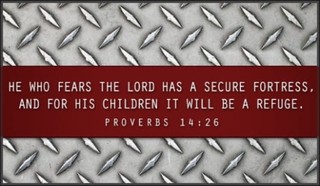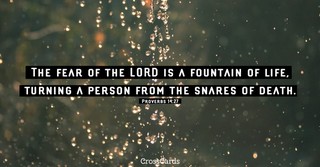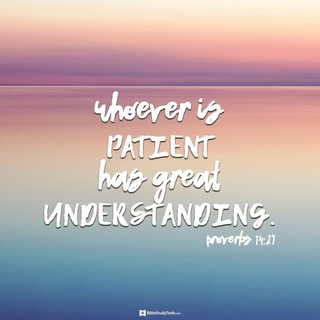
- Recent Translations
- All Translations
Mishle 14
Share
Settings
Mishle 14 Commentary
Chapter 14
Verse 1 A woman who has no fear of God, who is wilful and wasteful, and indulges her ease, will as certainly ruin her family, as if she plucked her house down. Verse 2 . Here are grace and sin in their true colours. Those that despise God's precepts and promises, despise God and all his power and mercy. Verse 3 . Pride grows from that root of bitterness which is in the heart. The root must be plucked up, or we cannot conquer this branch. The prudent words of wise men get them out of difficulties. Verse 4 . There can be no advantage without something which, though of little moment, will affright the indolent. Verse 5 . A conscientious witness will not dare to represent anything otherwise than according to his knowledge. Verse 6 . A scorner treats Divine things with contempt. He that feels his ignorance and unworthiness will search the Scriptures in a humble spirit. Verse 7 . We discover a wicked man if there is no savour of piety in his discourse. Verse 8 . We are travellers, whose concern is, not to spy out wonders, but to get to their journey's end; to understand the rules we are to walk by, also the ends we are to walk toward. The bad man cheats himself, and goes on in his mistake. Verse 9 . Foolish and profane men consider sin a mere trifle, to be made light of rather than mourned over. Fools mock at the sin-offering; but those that make light of sin, make light of Christ. Verse 10 . We do not know what stings of conscience, or consuming passions, torment the prosperous sinner. Nor does the world know the peace of mind a serious Christian enjoys, even in poverty and sickness. Verse 11 . Sin ruins many great families; whilst righteousness often raises and strengthens even mean families. Verse 12 . The ways of carelessness, of worldliness, and of sensuality, seem right to those that walk in them; but self-deceivers prove self-destroyers. See the vanity of carnal mirth. Verse 14 . Of all sinners backsliders will have the most terror when they reflect on their own ways. Verse 15 . Eager readiness to believe what others say, has ever proved mischievous. The whole world was thus ruined at first. The man who is spiritually wise, depends on the Saviour alone for acceptance. He is watchful against the enemies of his salvation, by taking heed to God's word. Verse 16 . Holy fear guards against every thing unholy. Verse 17 . An angry man is to be pitied as well as blamed; but the revengeful is more hateful. Verse 18 . Sin is the shame of sinners; but wisdom is the honour of the wise. Verse 19 . Even bad men acknowledge the excellency of God's people. Verse 20 . Friendship in the world is governed by self-interest. It is good to have God our Friend; he will not desert us. Verse 21 . To despise a man for his employment or appearance is a sin. Verse 22 . How wisely those consult their own interest, who not only do good, but devise it! Verse 23 . Labour of the head, or of the hand, will turn to some good account. But if men's religion runs all out in talk and noise, they will come to nothing. Verse 24 . The riches of men of wisdom and piety enlarge their usefulness. Verse 25 . An upright man will venture the ( proverbs 14:26-27 ) Those who fear the Lord so as to obey and serve him, have a strong ground of confidence, and will be preserved. Let us seek to this Fountain of life, that we may escape the snares of death. Verse 28 . Let all that wish well to the kingdom of Christ, do what they can, that many may be added to his church. Verse 29 . A mild, patient man is one that learns of Christ, who is Wisdom itself. Unbridled passion is folly made known. Verse 30 . An upright, contented, and benevolent mind, tends to health. Verse 31 . To oppress the poor is to reproach our Creator. Verse 32 . The wicked man has his soul forced from him; he dies in his sins, under the guilt and power of them. But godly men, though they have pain and some dread of death, have the blessed hope, which God, who cannot lie, has given them. Verse 33 . Wisdom possesses the heart, and thus regulates the affections and tempers. Verse 34 . Piety and holiness always promote industry, sobriety, and honesty. Verse 35 . The great King who reigns over heaven and earth, will reward faithful servants who honour his gospel by the proper discharge of the duties of their stations: he despises not the services of the lowest.
Mishle 14 Commentaries
Chapter Summary
INTRODUCTION TO FIRST KINGS 4
As in the preceding chapter we have a proof of the wisdom and understanding which the Lord gave to Solomon, as promised, so in this an account is given of the riches and honour he was possessed of; of him, as king over all Israel, and of his princes, 1Ki 4:1-6; of the providers of food for his household in the several parts of the land, 1Ki 4:7-19; of the largeness and extent of his dominions, and of the peace and prosperity thereof, 1Ki 4:20,21,24,25; of his daily provisions for his household and for his cattle, 1Ki 4:22,23,26-28; and of his superior wisdom and knowledge to all others in all nations, which brought some out of all to hear it, 1Ki 4:29-34.

